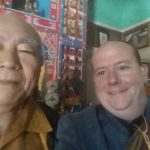In my two visits to Thailand, I have seen doctors in at least three cities – Pattaya, Chaing Mai, and now Phuket. The routine is just that – a routine that I can now confirm is efficacious in getting you what you need.
Most Thai doctors and nurses speak at least some English – most M.D.s have a reasonable degree of fluency, as many of them have studied outside of Thailand and usually in the United States or England.
1) Find out the name of a reputable hospital in your area using either the Internet or a friendly Thai informant.
2) Find out the exact address of the hospital and get a taxi to it, preferably with the aid of a Thai-speaking person to tell the driver where you are heading.
3) BRING YOUR PASSPORT. They will need it. Treatment of foreigners is within their declaration of human rights document regarding medical treatment, and I believe it is regardless of ability to pay.
4) They will ask you what you need. Tell them the truth about what you are needing.
5) There will be forms to fill at each hospital and then you will receive a card so that you don’t need to re-register each time. I have cards for hospitals in Pattaya, Chiang Mai and Phuket.
6) Generally, you will see a doctor on the day you arrive, and my experience is that the wait is not long. Thai hospitals are very conscientious when it comes to receiving foreign patients. In one case, because I asked to see a specialist, I was told to come back the following day – I later discovered while they had a psychiatrist on staff the first day I came, they wanted me to see their best one and so had me come on the following day when his schedule was not so full.
7) Your doctor will invariably speak English. Describe symptoms, ask for what you need – I find Thai doctors to be much more compassionate than their Western counterparts.
8) If you have needs just for medication, you may not need to see a doctor. My first visit to Thailand, I lost all my meds on the plane coming in – I visited a small pharmacy near where I was staying and they directed me to a Wondrous place called Fascino, a truly Disco-pharmacy, very sleek and modern and well-stocked. Lithiums were 3 baht a piece – they basically let me have anything I wanted and the prices were beyond decent. I bought a three-month med supply for less than $250.
9) Most small pharmacies will sell benzodiazepines of all kinds (Valium, Ativan, Xanax, etc.) sexual aids (Viagra, etc.) and even heavy meds like Percoset over the counter for very reasonable prices.
10) A small warning: Hospital pharmacies are rumored to be more expensive than their commercial counterparts, but doctors are required to write scripts for their hospital pharmacies. Ask for a seven-day supply – once you have the name of the drug and prescription envelope in hand, you can get the script filled in any other pharmacy in Thailand – generally speaking, that has been my experience, but of course it might not work everywhere. For the last round of benzos I had prescribed at a doctor’s, the price was 140 baht for a 14-day supply in a hospital pharmacy – 10 baht per pill. (roughly 30 cents a pill.) A lot less than you’d be expected to pay in the US, that’s for sure.
What follows is a short list of hospitals in the cities I have been:
Bangkok Hospital Pattaya (in Pattaya on the baht bus route)
Chiang Mai Ram (located just outside the moat, as I recall)
Bangkok Phuket Hospital (located in Phuket Town)
For those of you concerned that you might need in-patient for a psychiatric illness, I have heard there is an outstanding facility in Hat Yin, but I have no direct experience of it. As always, try your best to meet Thai people who also speak English and ask around of them as well as seasoned ex-pats in your area.
